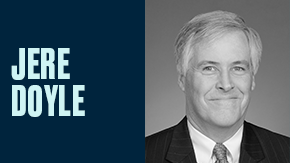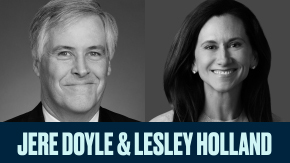DATE PUBLISHED: OCTOBER 11, 2024
History proves that election results do not significantly impact the stock market. In fact, equities have performed well no matter what type of administration or Congress takes office. However, the outcome of the election may drive returns at the sector level. In this episode of Your Active Wealth, Alicia Levine, head of investment strategy and equities, and Kevin Shea and Matt Keeler, senior equity analysts, identify four key policy themes that equity sectors will contend with and analyze the implications of the candidates’ proposals if they are adopted.
Subscribe to Your Active Wealth on your favorite podcast platform via Apple Podcasts, Spotify, Amazon Music, Pocketcast and more.
Featuring: Alicia Levine, Head of Investment Strategy and Equities, BNY Wealth
Matthew Keeler, Senior Equity Analyst, BNY Wealth
Kevin Shea, Senior Technology Analyst, BNY Wealth
[00:00:01] VO: What do you want your wealth to do for you? Welcome to Your Active Wealth from BNY Wealth, where we offer insights that can help support the life you want to live and the legacy you wish to create. We tackle timely topics through the lens of the five strategies that comprise our Active Wealth framework: Invest, Protect, Manage, Borrow and Spend, and provide guidance on navigating the unpredictable to help you build and sustain wealth.
[00:00:30] Alicia: Hi, everyone. I'm Alicia Levine, head of investment strategy and equities. And I'm the host today of the episode. Welcome back to Your Active Wealth. So we're in the thick of election season here in the U.S. And with Election Day quickly approaching, we wanted to answer some common questions that we've been receiving on how the election outcome may impact the stock market. Before we start, and this may be surprising to some of our listeners, but there is little evidence that election results actually determine market performance. In fact, since 1945, the market has been up six out of seven years. So, history tells us that the stock market can do quite well under all types of administrations with different configurations of Congress. But since policy and regulation can have an impact on specific sectors and industries, we knew it would be interesting to look under the hood with a few of our equity analysts from BNY wealth. So today we're speaking with Kevin Shea, senior technology analyst and Matt Keeler, senior equity analyst covering health care, consumer discretionary and consumer staples at BNY Wealth. We’re excited to gain the perspectives on how the various policy platforms of each candidate could impact the sectors they cover. Welcome, Kevin and Matt.
[00:02:05] Kevin: Thank you, Alicia. It's great to be here.
[00:02:07] Matt: Yeah, thanks for having us. Excited to share how we're thinking about the election.
[00:02:11] Alicia: Perfect. First, I think it's important to remind listeners that what gets passed into law can look very different than what is proposed on the campaign trail. And in many cases, it will depend on the makeup of Congress. But I think it would be helpful to share with listeners the policy themes that we believe will be important to watch in this election cycle.
[00:02:34] Kevin: Absolutely. So there are a multitude of issues that are being debated, but we believe there are four broader themes that have the greatest potential ramifications on the fundamentals of specific industries and companies. The first is trade policies, including tariffs and how this could alter domestic and global demand. Second is corporate taxes and its repercussions on cash generation and also cash usage. Third is going to be immigration and its consequences to the labor market and inflation. And four, changes within the Federal Trade Commission and how this could influence companies willingness to pursue M&A and how that decision could alter their capital allocation strategies.
[00:03:25] Matt: Great. And I just wanted to note, in addition to those broader themes that Kevin just described, there are a few ways the election could uniquely impact the health care sector, as the two candidates differ in their approaches of how managed Medicaid, Medicare Advantage and the Obamacare Affordable Care Act programs are funded. Also, the candidates have different views around regulating drug prices and providing funding for the National Institute of Health, which is an important source of revenue for the life sciences, tools and diagnostics sector.
[00:03:49] Alicia: Okay. So we have a lot to discuss here. I'd like to start with corporate taxes, because the candidates truly are divergent in their proposals and their views on corporate taxes. Trump says he will focus on maintaining or lowering corporate and personal taxes, whereas Harris has a more progressive approach to the tax structure. During his term, Trump lowered the corporate tax rate from 35% to 21% and has mentioned lowering taxes again to 15% for those companies who manufacture exclusively in the U.S. Harris, on the other hand, has previously indicated that she would raise corporate taxes to 28%. Now, can both of you provide a little context as to how a higher corporate tax rate may affect specific industries?
[00:04:44] Kevin: Sure. So on a relative basis, the technology industry has a very attractive tax profile, meaning the industry's cash tax payments as a percentage of revenue are often lower than other industries. And this is due to various reasons. It includes companies ownership of intellectual property and lower tax jurisdictions, a more geographically diversified revenue profile, as well as less mature companies often operating near break even as they invest more heavily in growth. That being said, some of the largest technology companies often referred to as the Magnificent 7, are very profitable and currently have an average of a 17% tax rate. So still below the statutory 21% rate. In a Harris-led scenario of higher tax rates, we believe she will target a 28% tax rate, although we think the odds are unlikely, she would be able to pass that type of rate increase and it could be closer to 24%- 25%. However, for illustrative purposes, to give context for the listeners on the headwind it would represent, a 28% tax rate would drive the Magnificent 7's rate closer to 23%. This would drive a $48 billion increase in tax liabilities. And while this seems modest, given that $2.3 trillion in revenue they are expected to generate in 2025, it is more meaningful when compared to capex assumptions. It would equate to approximately 22% of their collective capex plans. So, it is likely it could have ripple effects to other companies that are more reliant on the Magnificent 7’s spend, particularly those in the semiconductor industry.
[00:06:36] Matt: Okay. And then turning to health care. Similar to what Kevin described in tech, the big multinational pharma and device companies tend to have intellectual property housed overseas, which helps to lower their overall tax rates. So, in the event that U.S. tax rates move higher, companies can always look to move profits to lower tax domiciles. And that's a nice hedge. It isn't a perfect hedge as companies have to keep that cash outside of the country to avoid paying taxes on it. And so if that's dropped overseas permanently, it kind of limits the funds available for U.S. capex and share repurchases. But at least it puts these companies on better footing than those that are more domestically exposed. And within healthcare, those with the heavy domestic tax disclosure include managed care hospitals, drug distributors and drug stores. Turning to consumer, lower corporate tax rates under Trump would benefit the consumer discretionary sector, including names of the restaurants, lodging, regional gaming, hardlines, broad lines and grocery spaces. Turning to individual tax rates, if we were to see higher taxes on high income households under Harris, that could dampen luxury goods spending, which could impact some consumer discretionary names. However, an expansion of the child tax credit, if implemented under Harris, could benefit some retail consumer names.
[00:07:50] Alicia: So, you know, I just want to close this section by talking about the impact actually on the S&P itself of a higher corporate tax rate. So if the Harris administration is able to raise corporate taxes from 21% to 28%, there could be up to an 8% haircut on expected S&P earnings. Everything else being equal, as a result of the higher taxes. Now, we discussed that it's more likely to be something like 24% or 25% because we expect a mixed Congress. But if that's the case, 24%, 25%, there will still be a haircut on S&P earnings. It just won't be as much as 8%. So it's really something to look forward to. And of course, the ability to either cut taxes further on the corporate side or to raise taxes depends on the makeup of Congress. So, it's really important that our listeners realize that. But let's move over to trade and tariffs, because I'd say this is really an area where there is another large point of differentiation between the two candidates. Many expect that Vice President Harris would maintain the status quo on tariffs, which already includes tariffs on solar panels, steel, aluminum and goods from China. But in the presidential debate, Trump indicated he could implement a 10% to 20% global tariff at the border, as well as a 60% tariff on U.S. imports from China. Now, since a president does have the authority to impose tariffs on his or her own through the administrative action, it will be important to consider the potential impact that they may have on companies. Matt, I'm going to turn to you first on this.
[00:09:49] Matt: Sure. So I think, under a higher tariff scenario under Trump, we think consumer discretionary names would likely have a negative impact. You'd see higher freight and tariff escalation impacting discretionary general merchandise imports with some of the most exposed categories being toys, games and sporting goods, consumer electronics, footwear, home furnishings, household appliances and apparel. And we see a lower risk in restaurants, but certainly companies with operations in China could be affected somewhat as well. [00:10:21] Alicia: And of course, a lot of economists think that higher tariff policy could lead to inflation as well. So you mentioned the FTC and its impact on M&A activity as a theme you are watching, Kevin. And as we know, the president appoints the FTC chair. And in its current form, the FTC has leaned more restrictive, making it difficult for companies to make meaningful acquisitions both horizontally and vertically. We would expect the more lenient FTC under Trump than under Harris. Now, we should, of course, weigh in here that the FTC chair has to be confirmed by the Senate. But having said that, what do you see going forward here?
[00:11:05] Kevin: So the changes to the FTC and the Department of Justice will be meaningful. The FTC and DOJ have taken a more active and restrictive approach in the technology industry, particularly when it involves M&A or consumer data or any type of monopolistic behavior. In the past few years, we've seen technology companies face a lot of push back with their M&A ambitions. And we know M&A activity is driven by various factors. It's not just about the political landscape. But it's interesting that with this backdrop, 2023 saw the least amount of M&A activity versus the past ten years and was 45% below the most recent five-year average. And so we think a more lenient FTC and DOJ could accelerate M&A activity, particularly given the amount of cash on balance sheets and with interest rates being lowered. But we would caution be careful what you wish for. So historically, M&A has not always been great for the stock of the acquirer. So their execution risk increases, particularly as founders eventually lead the acquired company. And it's difficult to sustain that innovation as they acquire companies integrated into a larger, sometimes more bureaucratic company. Also, companies that are actively involved with M&A, they often have to limit their buyback programs. And looking at history, when a company does meaningful and consistent buybacks and has that capital discipline, there's a strong correlation to stock outperformance versus the market. And so we're all over the past three years, M&A activity has declined. And as a result, we've seen the Magnificent 7 reallocate some of this capital to stock buybacks. And this has actually grown 47% during that time frame. So yes, we do expect that M&A activity could pick up with a more lenient FTC and DOJ, although it might come at the expense of the elevated buybacks that we are seeing right now.
[00:13:17] Kevin: Some good points, Kevin. I think, you know, if we turn to health care and you talk to the companies, most say that they can get the deals done that they want to get done under the current administration. But definitely the process is more difficult than it has been in the past. There are more secondary requests from the FTC, which increases the time you spend and the money you spend on making those deals happen. And certainly we've seen in some cases the FTC has sought to block transactions. And this may not deter, you know, the largest companies with the most resources from pursuing M&A, but it is definitely increasing the hurdle rate calculation. And we think that probably could tend to discourage some of the smaller or medium players from considering certain transactions. So like what Kevin said, I think on balance we could see the pace of M&A pick up under a different FTC regime.
[00:14:05] Alicia: Great. So I'd love to turn to immigration policy here because as you know, we've had a lot of immigration in the last few years to the country, and a lot of economists think that has actually benefited growth and kept wages lower so as not to be inflationary. So I'd like to talk about how the different immigration policies could drive either wages higher if there are limits on immigration, as Trump proposes, versus Harris's approach, which is not to deviate from the status quo, although, of course, she has pledged to increase legal immigration. But, you know, clearly the proposals are different, and you're likely to get more immigration under a president Harris.
[00:14:48] Matt: Yeah, maybe we could turn to consumer here. I think tighter immigration rules would certainly limit the labor pool and result in higher labor costs. Within consumer discretionary, the sectors with the most reliance on U.S. labor include Hardlines, Broadlines and restaurants and then turning to staples, the food and retail names have the highest reliance on the U.S. labor force. Within household personal care and beverages, those are less exposed to than food, but would still be impacted somewhat. And then in healthcare, you know, the subsectors with the most leveraged U.S. labor costs are similar to those with the high U.S. tax exposure. It's managed care, health care providers, drug stores and drug distribution.
[00:15:31] Alicia: Yeah. Look, it just seems that these two candidates have very different policy proposals on a lot of different issues that could affect the economy. But as we wrap up here, do you guys have any final takeaways for our listeners?
[00:15:45] Kevin: Right. So policies get a lot of attention and are often met with elevated emotional reactions. But the reality is stock performance is driven by earnings growth and innovation. And it's important to know for my sector, technology has performed well across all political landscapes. The underperformance is often driven by economic cycles and valuation levels. And in my sector, we saw tech companies react and adjust their supply chains when tariffs were initially put in place. We're seeing companies higher globally. This limits the overall effect immigration changes could potentially have. You know, the industry has seen a lot of disruption with export restrictions, yet many of those same companies are experiencing some of their fastest growth with a higher margin profile. So I would leave listeners with the takeaway that it's important to not invest with your emotions, but look for innovative companies or industries that can create value and differentiation over the longer term.
[00:16:48] Matt: Yeah. And I’ll just expand on Alicia's earlier point to say, you know, we have a split Congress today and that may still well be the case following the upcoming elections. And that impacts what kind of policies the President can actually implement. So, you know, we talked about changes to corporate tax rates. Those would require congressional approval. Changes to the FTC, DOJ appointments, those would generally only require Senate approval whereby changes to tariffs and immigration could be achieved through executive order.
[00:17:17] Alicia: So this was great, Kevin and Matt. And I think we did a deep dive on a couple of sectors here that's really interesting for our clients. And as we've said, I just want to reiterate that historically there's no evidence that election results determine market performance over the long term. And in fact, history tells us that the stock market can do quite well under all types of administrations and all configurations of Congress as well. So don't let campaign proposals overly influence your investment decisions, given that what a presidential candidate can actually achieve through Congress can be very different than what they promise when they are trying to get into office, as the checks and balances provided by the House and the Senate determine what can get done from a legislative perspective. Don't invest with your politics, but rather stick with your long-term investment plan aligned to your wealth goals. We believe it's the best approach for navigating any near-term volatility that may materialize as the election draws closer. For more information on the four themes we discussed today and for other views on the upcoming election, please visit our election hub on bny.com/wealth or reach out to a BNY Wealth representative. Thanks so much for joining today and we'll see you all on our next episode of Your Active Wealth.
[00:18:47] VO: Thank you for listening to this episode of Your Active Wealth. Be sure to subscribe to this podcast on Apple Podcasts, Spotify, or wherever you listen to podcasts, and visit bny.com/wealth to view the latest insights on the subjects that matter most to you.
BNY Wealth conducts business through various operating subsidiaries of The Bank of New York Mellon Corporation. BNY and Bank of New York Mellon are corporate names of The Bank of New York Mellon Corporation and may be used to reference the corporation as a whole and/or its various subsidiaries generally. This material does not constitute a recommendation by BNY of any kind and is provided for illustrative/educational purposes only. The information herein is not intended to provide tax, legal, investment, accounting, financial or other professional advice on any matter, and should not be used or relied upon as such. Effort has been made to ensure that the material presented herein is accurate at the time of publication. However, this material is not intended to be a full and exhaustive explanation of all of the investment or financial options available. The information discussed herein may not be applicable to or appropriate for every investor and should be used only after consultation with professionals who have reviewed your specific situation. This material, and the statements contained herein, are not an offer or solicitation to buy or sell any products (including financial products) or services or to participate in any particular strategy mentioned and should not be construed as such. Any investment strategies referenced in this material come with investment risks, including loss of value and/or loss of anticipated income. Past performance does not guarantee future results. The views expressed within this material are those of the contributors and not necessarily those of BNY. BNY has not independently verified the information contained in this material and makes no representation as to the accuracy, completeness, timeliness, merchantability or fitness for a specific purpose of the information provided in this material. BNY assumes no direct or consequential liability for any errors in or reliance upon this material. BNY will not be responsible for updating any information contained within this material and opinions and information contained herein are subject to change without notice. This material may not be reproduced or disseminated in any form without the prior written permission of BNY. Trademarks, logos and other intellectual property marks belong to their respective owners. ©2025 The Bank of New York Mellon. All rights reserved. WM-734149-2025-05-05
Listen to more episodes

Alicia Levine and Dan Clifton on 2026: consumer refunds, deregulation, Fed cuts, tariffs and midterm dynamics—why policy could turn headwinds into tailwinds for growth and earnings.

Terry Sylvester Charron, head of investment advisory and planning solutions, and Jere Doyle, senior wealth strategist, unpack changes to Qualified Small Business Stock as result of OBBBA.

Scott Lillis, regional president, Mid-Atlantic Region, and Lynda Ly, private banking manager, explain our strategic cash management framework

With the One Big Beautiful Bill Act (OBBBA) recently signed into law, a host of tax changes are set to go into effect, impacting high net worth individuals and the wealth plans they have in place.